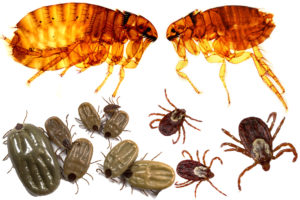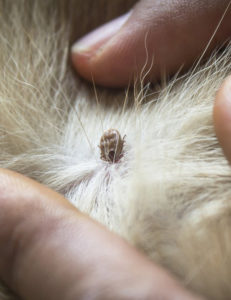Cat Fleas and Ticks
 THE DANGERS OF FLEAS AND TICKS FOR CATS
THE DANGERS OF FLEAS AND TICKS FOR CATS
Of all the nasty pests your cat faces, fleas and ticks are two of the worst and cause many potential health issues, including:
- Itching
- Skin irritation
- Suffering
- Transmission of disease and illness
- Rashes & Skin Infections

Another danger that fleas and ticks present for cats and cat owners is an infestation of the home and the possibility that fleas and ticks could transfer disease to humans through the shared living space. Many people believe indoor cats are immune to fleas and ticks, but this is not true. Fleas and ticks enter homes from being attached to both visiting pets and human’s clothing.
When a flea gets on your cat, it produces 30-50 eggs within 24 hours. Flea eggs are the consistency of sand and fall off the cat, land in the carpet or bedding and then, between 14 and 356 days, become adult fleas. The rate at which they reach maturity depends on environmental conditions.
Tick egg maturation includes the stages of larvae, nymph, and adult. Depending on which stage the tick is in, the tick will feed and either climb off the cat for the next molt (molt refers to how ticks move from one stage of development to the next) or, if, at the adult stage, the tick will produce eggs that may contaminate the house.
Ticks transmit disease in the nymph and adult stages. Lyme Disease and Rocky Mountain Spotted Fever are among these diseases that can be transmitted by ticks. The plague and cat scratch fever are also carried by fleas.
Flea and tick prevention is vital for every cat. Prevention reduces the risk of exposure to both your cat and your home.
FLEA AND TICK PREVENTION FOR CATS
At the Animal Clinic of Billings, our primary focus for addressing the problems associated with fleas and ticks is to prevent them from ever happening in the first place. Flea and tick prevention is absolutely necessary for dogs and cats because it stops many serious problems before they’re ever able to start. Noticing signs and symptoms of fleas and tick indicates you are already dealing with an infestation. It’s important that you try not to ever reach that stage.
Understanding flea and tick prevention products will help you avoid a flea and tick infestation, as well as, help keep your cat, yourself, and your family happy and healthy.
The proper approach to flea and tick prevention starts with a discussion about the factors that play a role in your cat’s exposure to fleas and ticks.
Scenarios include the following:
- If your cats are indoor/outdoor pets
- If your cat is exposed to other animals that go outside (pets of friends or family that may drop by for a visit).
There are many flea and tick products our veterinarians urge you to avoid. Each year, the Animal Clinic of Billings veterinarians review each new and available flea and tick product to ensure our recommendations are as up to date and accurate as possible.
Treatment considerations include effectiveness, safety, and expense. One of our veterinarians will help you design the perfect parasite prevention plan to meet the individualized needs of your pets and family.
HOW TO TELL IF YOUR CAT MAY HAVE A FLEA OR TICK INFESTATION
Common symptoms of fleas and ticks on cats include:
- Red, inflamed, or irritated skin
- Visible fleas or ticks in your cats hair, or on your cats body
- Aggressive or excessive scratching
- Scabs, dandruff, or flakes on your cats skin
- Excessive licking or grooming
FLEA AND TICK TREATMENT FOR CATS
There are dozens of flea treatment products for cats on the market. Products include a multitude of remedies containing useless substances with no medical validity. Our veterinarians strongly recommend you to never use an over-the-counter flea and tick medication without asking a veterinarian first.
Standard cat flea treatment includes:
- Flea and Tick Oral Tablets: The tablets are a wise choice for flea and tick prevention and treatment, and they are perfectly safe for your cat and your family. Oral flea and tick medications are prescription medications and can only be obtained through your veterinarian. A veterinarian can only prescribe oral pills.
- Spot-On Flea Treatments: There are a variety of spot-on flea and tick treatments with varying effectiveness. At your next appointment with an appointment, at the Animal Clinic of Billings, we will assist you in choosing the most effective spot-on flea and tick treatment for your cat.
- Flea and Tick Powders: Flea and tick powders kill ticks and fleas on contact. They can also be effective at repelling and prevent new flea or tick infestations. If flea and tick powders are needed, our veterinarians can help identify the right brand and propper usage depending upon your cats individualized needs.
- Cat Flea Collars, and Sprays: Our veterinarians do not recommend most flea collars, powders or sprays because they are more toxic and less effective than the modern oral and spot-on flea and tick prevention products we use at the Animal Clinic of Billings.
Our veterinarians choose products based on the safety and efficacy of our patients. As with any new medication or product, however, there is always going to be a very unlikely chance that your cat may experience an adverse reaction.
If you have noticed your cat displaying any signs of discomfort or behavioral changes after applying a flea and tick prevention product, please call us to schedule an appointment with a veterinarian.
There are a few dog flea and tick products on the market that kill cats. Please double-check the product you are using and talk to your veterinarian beforehand to ensure the flea and tick product you are using is made specifically for cats.
FINDING AND TREATING TICKS ON CATS

Thanks to a cats grooming habits and lifestyle, ticks on cats are not as common as ticks on dogs. Cats can, however, get ticks – which may become a health issue if not treated.

Ticks feed on blood from a host using tiny, sharp teeth to embed themselves into a cat’s skin and soft tissue. Because ticks penetrate the bloodstream, these pests also spread blood-borne illnesses. Our veterinarians at the Animal Clinic of Billings base their recommendation for which tick product we give to our feline patients bases on a case by case instance.
Ticks cause welts and bruises around the area being fed on. It is common to find a tick still attached to the host. If there is a tick on your cat, bring your furry friend to us, and we will demonstrate the safest way to remove the tick. We will also formulate a plan to avoid ticks in the future.
SCHEDULE A CAT FLEA AND TICK APPOINTMENT
To guarantee your cat is protected against fleas and ticks, schedule an appointment with one of our veterinarians ASAP. Our veterinarians and support staff here at the Animal Clinic of Billings and Animal Surgery Clinic have extensive experience in both preventing fleas and ticks on cats and treating already existing flea and tick problems. Our veterinarians are here to help you, and your cat get through any problematic medical or health problem that may arise.
 Let our highly trained and experienced team of veterinarians and veterinary technicians help you keep your cat as happy, healthy, and free of ticks and fleas as possible.
Let our highly trained and experienced team of veterinarians and veterinary technicians help you keep your cat as happy, healthy, and free of ticks and fleas as possible.
Call the Animal Clinic of Billings to schedule your cats next wellness examination with us!
1414 10th St. West, Billings MT 59102
406-252-9499 REQUEST AN APPOINTMENT



